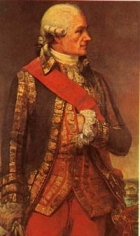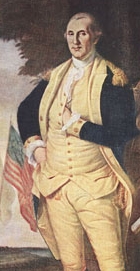Questions relating to Washington's authority as the commander-in-chief of the allied armies in America during 1780-83 can be explained by the French archival material presented in this webpage. French text material was obtained and submitted by M. Jacques de TRENTINIAN, French Sons of the American Revolution and Society of the Cincinnati. Loose English translations have been attempted and added in blue text by this webage monitor

| Some misunderstanding exists as to George Washngton's command status in respect to the French army commander Rochambeau. The French War Minister's instructions to Rochambeau specifically identified George Washington as the overall 'allied commander' ['supreme commander' in modern terms]. Washington was not made a 'marshal of France', as some popular legends suggest, but he was recognized as a 'g�n�ralissme' of the US Congress. In keeping with European conventions of the times, that title designated an overall commander of all allied land forces in the campaign region. * |

|
"G�n�ral en chef " was used in French documents for both for Rochambeau and George Washington, but the Ministre de la Guerre explicitedly identifies the subordination of the former to the latter, qualified as a "g�n�ralissime". Larousse Universel defines 'g�n�ralissime' as a general invested with supreme command of troops of one country or of a coalition [forces of more than one country]. The origin of the term is from the Latin generalissmus, superlative of generalis -- 'g�n�ral' in French. For example, G�n�ral Foch was �g�n�ralissme des arm�es alli�es' in 1918. Unfortunatly many Anglophone texts translate the French term �g�n�ralissme' as �generalissimo', the Spanish adoption of the Latin expression that is often associate in modern times with military leaders who ascend to political power by a military coup. Therefore, the eighteenth-century French meaning of �g�n�ralissme' is best translated today as �supreme allied commander' as it applied to George Washington's status in 1781- 1783.
| * Rochambeau did receive written instructions to render to Washington, the President of the US Congress, and the governors of the various states the honors due a Marshal of France. This was a ceremonial distinction and not a military command relationship. |
"De par le Roy, Sa Majest� ayant jug� � propos d'assembler un corps de troupes dont elle veut et entend que le sieur comte de Rochambeau, l'un de ses lieutenants g�n�raux en ses arm�es prenne le commandement, elle mande et ordonne aux mar�chaux de camp, brigadiers, colonels, mestres de camp, officiers du corps royal d'artillerie et celui du g�nie, g�n�raux des vivres et autres commis, capitaines, chefs et conducteurs des gens de guerre, tant de cheval que de pied, fran�ais et �trangers qui serviront dans ledit corps de troupes, et tout autre qu'il appartiendra de reconna�tre le sieur comte de Rochambeau, en qualit� de commandant dudit corps de troupes, et de lui ob�ir et entendre en tout ce qu'il leur ordonnera pour le service de Sa Majest�, � peine de d�sob�issance. " Versailles, 1er mars 1780.
"By this order the king, His Majesty, having assembled a body of troops waiting to be commanded by the count de Rochambeau, one of the lieutenant generals in his armies, orders the mar�chaux de camp, brigadiers, colonels, mestres de camp, officers of the Royal artillery and those of the engineers, generals of logistical services, capitaines, troop commanders, cavalry as well as infantry, French and foreigners that will serve in the afore said troop units, and all others to recognize that the count de Rochambeau, commands all of these troops, and they are to obey him and hear all that he will order of them in the service of His Majesty." Versailles, 1 March 1780.
"Les projets et plans de campagne ou d'exp�ditions particuli�res seront ordonn�s par le g�n�ral am�ricain, d'apr�s le concert que Sa Majest� se flatte de voir r�gner entre les deux g�n�raux en chef, les g�n�raux et les particuliers des deux nations ... Les troupes fran�aises n'�tant qu'auxiliaires, devront, � ce titre, c�der le pas et la droite aux troupes am�ricaines ..." "Dans le cas o� la division fran�aise ne serait pas imm�diatement r�unie au g�n�ral Washington et qu'elle serait d�tach�e pour une exp�dition avec un corps am�ricain, chacun des deux officiers g�n�raux ou fran�ais ou am�ricain sera ind�pendant l'un de l'autre". 1er mars 1780
"The projects and campaign plans, or the special operations, will be under orders of the American general, based upon the firm understanding that His Majesty hopes will exist between the two g�n�raux en chef of the two nations. The French troops will be auxiliaries, with this title, they cede the right [field of honor] to the American troops..." "In the case where the French division would not be immediately under general Washington, and where it would be detached on an expedition with an American body, each of the two generals, French or American, will be independent of one and the other". 1 March 1780.
Instruction secr�te du m�me au m�me.
"Sa Majest� veut et ordonne au comte de Rochambeau de tenir, autant que les circonstances pourront le permettre, le corps de troupes fran�aises dont Sa Majest� luy a confi� le commandement, rassembl�s en un corps, et de repr�senter dans l'occasion � M. le g�n�ral Vashington (sic), g�n�ralissime des troupes du Congr�s et aux ordres duquel les troupes fran�aises doivent servir, qu'il ne soit fait aucun dispersement des troupes fran�aises, et qu'elles servent toujours en corps d'arm�e et sous les g�n�raux fran�ais, sauf les cas des d�tachements momentan�s et qui devront sous peu de jours rejoindre le corps principal, ....." 1er mars 1780.
"His Majesty wishes and orders the count de Rochambeau to hold as an assembled body, as much as the circumstances will allow, the French troops which His Majesty has confided to him in this order, and to represent to general Washington, g�n�ralissime of Congress' troops, the conditions under which the French troops must serve. If this is not done, French troops are not to be dispersed, and will always serve in army formations and under French generals, except the cases of brief detachments, where in a few days they will rejoin the main body, ....." 1 March 1780.
Return to webpages on:
Page posted 29 August 2004; revised 10 February 2010.